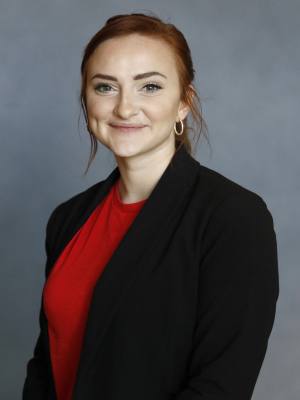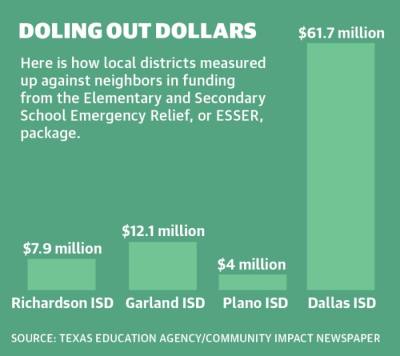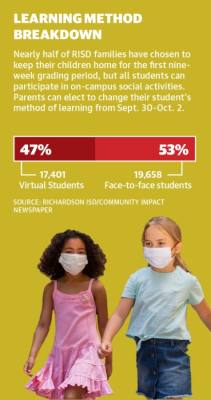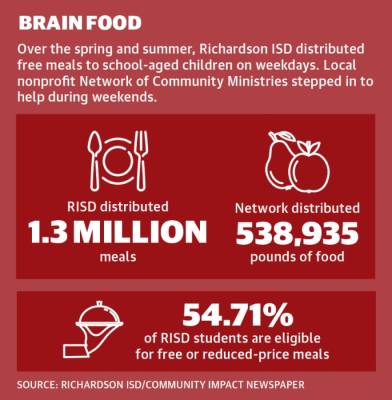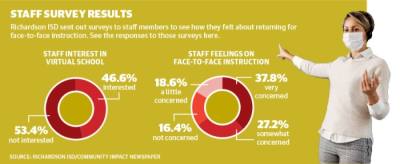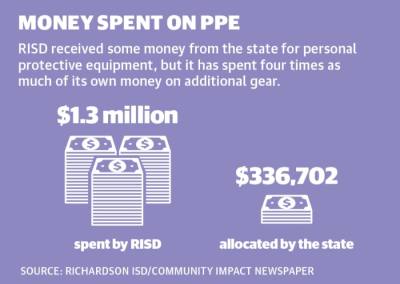RISD is home to schools of various sizes, which has proven to be one of the more complicated aspects of planning for the school year, Deputy Superintendent Tabitha Branum said. Some schools, such as White Rock Elementary, have as many as 1,000 students, while others have as few as 300, Branum said.
“To design a system around virtual school that works in both contexts ... is a little bit unique to RISD,” she said.
After months of nailing down logistics, students whose families have chosen in-person learning will return to campuses in phases throughout September. All students in the district began school virtually Aug. 19, and nearly half will remain at home for at least the first nine weeks of school. After that point, parents will have the option of changing their student’s method of learning.
Part of Richardson falls into Plano ISD, which has also made significant adjustments heading into the next school year. For more information on plans for that district, visit www.communityimpact.com/pln.
Financial impact not yet known
Texas school districts have received millions of dollars in coronavirus relief funds.The state doled out $7.9 million in funds to Richardson ISD and $4 million to Plano ISD—all made available through the Elementary and Secondary School Emergency Relief, or ESSER, package. This comes as part of the federal Coronavirus Aid, Relief and Economic Security, or CARES, Act.
While districts can plug up financial holes from the pandemic with these dollars, Cory Green, associate commissioner of the Texas Education Agency, said that ESSER funds will largely be used to cover reductions in state spending for the 2019-20 school year due to the pandemic.
Extra expenses in RISD are primarily tied to personal protective equipment but also include costs associated with academic intervention for students who fell behind when schools closed in March. Pandemic-related expenditures are made regularly, so the district will not know the true financial impact of the crisis for some time, officials said.
Fewer in need of bus transportation
The coronavirus has made the logistics of bus transportation more challenging as district leaders struggle to safely transport children to school.Students in RISD will be required to sit one per row unless they are sitting with another member of their household, Branum said. The seat behind the driver will remain empty, and staff will disinfect the bus after each route.
“We know ... that almost half of our kids won’t be riding the bus,” she said. “That is going to give us some additional capacity for those who do return for face-to-face [instruction].”
The district does not believe it will have to add bus routes, buses or drivers this year.
“With the number of students that are choosing virtual [instruction], we can really meet the demand of the kids who need to ride the bus with those smaller numbers,” Branum said.
Socialization still vital
Though school events are limited, socialization remains an important part of a child’s development, education experts said.“It’s probably part of why people want kids in school,” said Ranita Cheruvu, senior lecturer at the University of North Texas’ College of Education. “School is a huge part of how kids connect with their peers.”
Texas Education Agency has provided oversight and guidelines on back-to-school classroom procedures, but decisions about school events and how to host them lie with school districts, said Jake Kobersky, a media representative for the TEA.
RISD has canceled all assemblies, dances, live performances and pep rallies for the foreseeable future, Branum said. Crowd sizes at sporting events will be limited to 50%, she added.
“We will still have some of our band students performing, the drill team will be there, and cheer will be there, but it’ll look and feel very different than what they’ve expected,” Branum said.
Students attending virtual school are invited to weekly on-campus activities and will be able to use school resources, such as the library.
Staff is looking for ways to recreate the experiences students would have during a typical year, Branum said.
“It may [not be] what they were used to, but it’ll still feel very special,” she said.
Meals for all students
The district has committed to providing meals for all students even while some stay home.Students enrolled in virtual instruction can pick up meals at any campus on Tuesdays and Thursdays between 7:30 a.m.-2:30 p.m. These students are also still eligible for the free or reduced lunch program if they meet income requirements.
When the district closed schools and transitioned to virtual learning in March, meal services began providing breakfast and lunches for families to pick up. Over the summer, students from any district could receive free meals at the pickup sites.
In addition, local nonprofit Network of Community Ministries distributed 538,935 pounds of food in weekend meal boxes to 22,179 families in the district from March 16 to July 27.
The springtime meal service helped families who rely on RISD to provide food for their children, district parent Jessica Hale said.
“Normally, my kids get free [meals] at school every day for breakfast and lunch,” Hale said. “[RISD] doing this is saving us a lot of money.”
Students in need will also have access to Network’s mobile food pantry program, according to Tina Floyd, the organization’s development and marketing director. The service delivers food to families at high-need schools, and Network plans to expand the program to more schools, Floyd said.
Retention increases despite staff concerns
Cathy Nanni, a sixth-grade teacher at Prestonwood Elementary, said she is nervous about returning to the classroom for face-to-face instruction.“I’m worried about keeping us safe from a virus, but I’m also worried about the social-emotional impact of the kids having to go back and wearing masks all day,” she said.
Though some teachers are assigned to virtual instruction only, they were still required to be on campus beginning Sept. 4, Executive Director of Communication Tim Clark said.
The district offered a one-year furlough to teachers who wanted take the year off but still keep their job, Branum said. Seven teachers took RISD up on this offer, she said.
Despite concerns, the district is still seeing a higher staff retention rate than in the 2019-20 school year.
“We’re seeing less turnover this year, even in the midst of this time of uncertainty,” Branum said.
Substitute teachers are also expected to be in higher demand this year and will need a different set of skills than before, Branum said. To encourage substitute teachers to work in the district, officials are considering offering incentives.
Plan for positive cases
Students in Richardson ISD will fill out a questionnaire for virus symptoms weekly, and staff will self-screen daily, according to the district’s back to school plan. If a RISD student or staff member tests positive for the virus, the district will notify the local health department. Additionally, parents and staff at the student’s school will be notified. Those who were in close contact with the patient will be asked to quarantine at home for 14 days.


